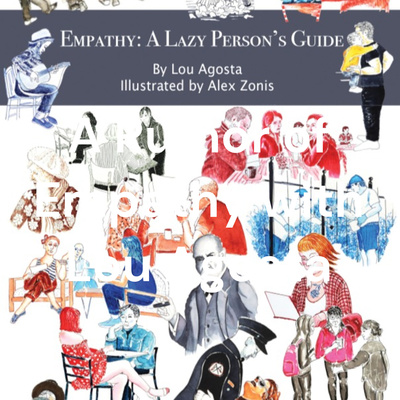
A Rumor of Empathy with Lou Agosta
By Lou Agosta, PhD
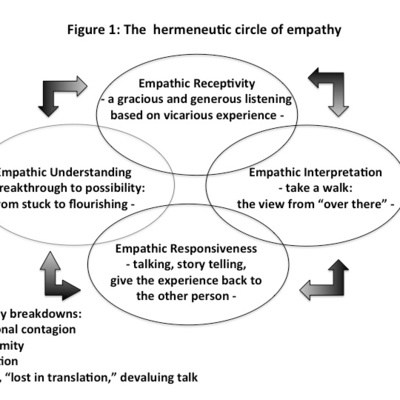
A Rumor of Empathy with Lou AgostaJun 06, 2021
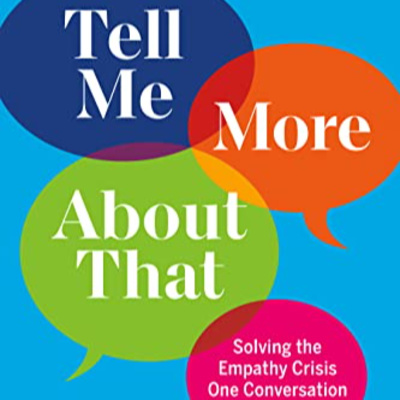
Interview with Rob Volpe about his empathy book: Tell Me More About That: Solving the Empathy Crisis One Conversation at a Time
Lou Agosta in conversation with Rob Volpe, CEO and Chief Catalyst, Ignite 360, about Rob's book on empathy: Tell Me More About That: Solving the Empathy Crisis One Conversation at a Time - in this conversation Rob shares what he had to survive and what he learned in the college of hard knocks when the intolerant kids in 5th grade decided to make Rob's sexual orientation a matter of bullying; how he survived these challenges; and brought what he learned to become an empathic story teller, calling forth insights about business, consumer products and services and, most importantly, human nature, the empathic ties that bind us together as fellow travelers in business and life. This is more - much more - than a business book, though its relevant to empathy in the context of business is powerful - as I like to say "empathy: capitalist tool"! Not to be missed!
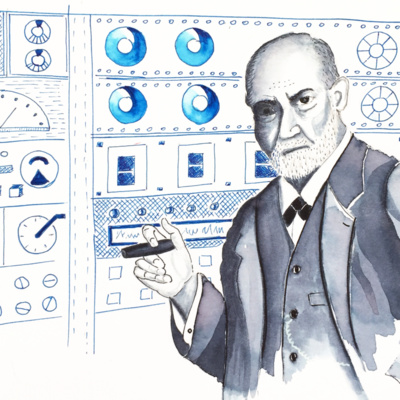
Transference and Empathy: Where Transference Was, Empathy Shall Be!
It a useful and powerful oversimplification that in transference people relate inauthentically whereas in empathy people relate authentically. (Here “authentically” means “without distortion (in so far as that is humanly possible),” “in integrity,” not in a moralizing sense, but in the sense of “with workability in the matter of not fooling oneself.”)
The point is to radicalize the relationship between transference and empathy even to the point of emphasizing divergences and tensions in order subsequently to identify methods of reconciliation and harmonization. That is going to be tough to do because there is a transference dimension (and so also a potential countertransference aspect) to most empathy breakdowns, misfirings or failures.
See Blog Post Version [not a transcript!] https://louagosta.com/2022/06/12/where-transference-was-empathy-shall-be/
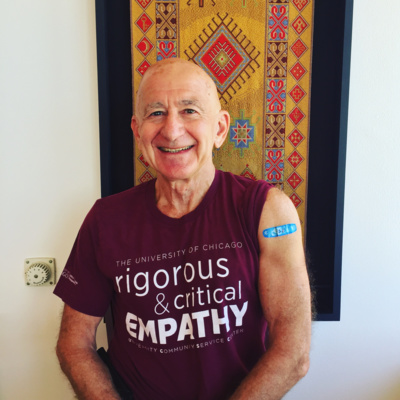
Empathy: Top Ten Trends for 2022
A new year and a new virus variant? Being cynical and resigned is easy, and the empathy training is to drive out cynicism and resignation – then empathy naturally comes forth. If given half a chance, people want to be empathic. The prediction is that with a rigorous and critical empathy (and getting a very high percent of the population vaccinated), we are equal to the challenge.
This podcast contains my choices and predictions for the top ten trends in empathy for the year 2022.
This episode is also available as a blog post: http://louagosta.com/2022/01/06/empathy-top-ten-trends-for-2022/

Empathy: Capitalist Tool (Part 3): Empathy by the Numbers
I have been known to say: "We don't need more data; we need expanded empathy!" But, in truth, we need both. The numbers support the conclusion that there is an empathy deficit in the corporate world; but there is also hope that the factors and forces are trending that make possible overcoming this deficit and expanding empathy.
Business leaders lose contact with what clients and consumers are experiencing as the leaders get entangled in solving legal issues, reacting to the competition, or implementing the technologies required to sustain operations. Yet empathy is never needed more than when it seems there is no time or place for it. This is a challenge to be engaged and overcome.
What to do about it? Practice expanded empathy. Empathy is on the critical path to serving customers, segmenting markets, positioning products (and substitutes), psyching out the competition—not exactly empathy but close enough?—building teams and being a leader who actually has followers. Empathy makes the difference for contributors to the enterprise at all levels between banging on a rock with a hammer in the hot sun and building a cathedral. The motions are the same. tExactly the same. But the one person has hard labor and the other person is participating in greatness - building a cathedral. When the application of empathy exposes and strengthens the foundation of community, then expanding empathy becomes synonymous with expanding the business. Find out more in this engaging podcast about how empathy works - and sometimes doesn't - in the dynamic and challenging world of business relations.
(c) Lou Agosta, PhD and the Chicago Empathy Project
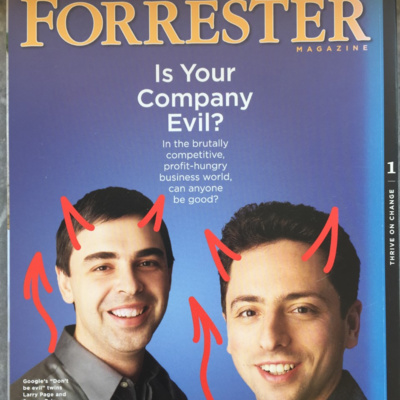
Empathy Capitalist Tool (Part 2): "CEO" now means "Chief Empathy Officer"
“CEO” no longer means “Chief Executive Officer,” but “Chief Empathy Officer.” One can hear the groans—this time, from the executive suite, not the cubicles.
Empathy is one of those things that are hard to delegate. This role shows up like another job responsibility with which the CEO of the organization is tasked—along with everything else that she already has to do. As if she did not already have enough alligators snapping at various parts of her anatomy, one has to be nice about it, too? But of course empathy is not niceness, though it is not about being un-nice. It is about knowing what others are experiencing, because one has a vicarious experience and then processing that further to expand boundaries and exercise leadership. Find out how to expand your empathy individually and in terms of organizational teamwork in this engaging podcast.
(c) Lou Agosta, PhD and the Chicago Empathy Project

Empathy: Capitalist Tool (Part 1): The Empathy Deficit in Business is Getting Attention
When I ask business leaders what is their budget for empathy training, the response is often a blank stare. Zero. However, when I ask the person what is the budget for expanded teamwork, reduced conflict, enhanced productivity, commitment to organizational goals, taking ownership of outcomes, product and service innovations, then it turns out that budget exists after all. Empathy makes a difference in connecting the dots between business skills and performance. In this engaging and dynamic podcast, find out how empathy contributes to getting breakthrough results in business in a powerful way by engaging the energies and commitments of executives, management, individual contributors, customers, and stake-holders at a fundamental level. Not to be missed!
(c) Lou Agosta, PhD, and the Chicago Empathy Project

Empathy and LIterature: Grand Rounds Presentation at Rush Medical University October 13, 2016
Most people think that empathy is compassion. And while the world needs more compassion, empathy is distinct from compassion. Empathy tells me what the other individual is experiencing; compassion tells me what to do about it. Engages with examples from world literature, including Thomas Mann's Buddenbrooks and Tennessee Williams, The Glass Menagerie. The scenes include empathic receptivity in Hanno's trip to the dentist and empathic understanding in Thomas' encounter with Hanno during the long silence as Gerda makes music with The Lieutenant. Empathic responsiveness is powerfully illustrated in William's work with Blue Roses. Not to be missed!
Watch the corresponding video on Youtube: https://youtu.be/sYJvplP5cKo
(c) Lou Agosta, PhD, and the Chicago Empathy Project
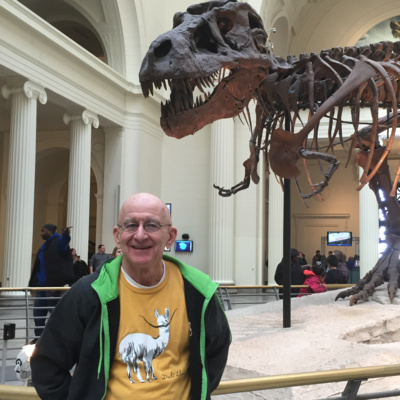
Empathy versus Bullying: Part 3: Recommendations for students, parents, and educators
In the first two episodes, bullying was defined and the uses of a rigorous and critical empathy to set limits and boundaries and contain, reduce, and stop bullying were explored.
This podcast provides extensive actionable recommendations and guidance for students, parents, and educators on how to handle bullies and bullying. Not to be missed!
[Note: even though these recommendations directly address the "student," they are intended provide guidance to the parent or responsible adult on how he or she is to address the student regarding bullying. They are intended to inform the grown ups speaking and listening in the matter of bullying as the grown up engages with their student.]
See related blog post: https://wordpress.com/post/louagosta.com/1131
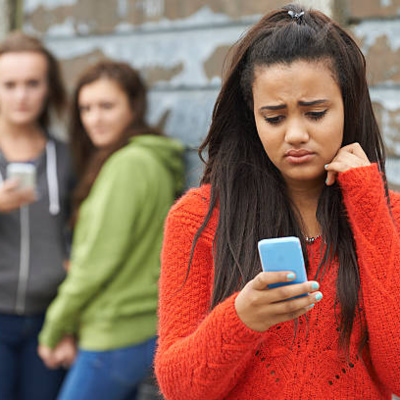
Empathy versus bullying: Part 2: Online bullying and what to do about it
The paradox is the anti-social nature of social networking. The computer screen isolates the person even as the person is trying to connect. The contrary is also the case. The screen connects the person when the person wants to be alone, rudely announcing an incoming message by beeping, demanding one’s attention. Sometimes the screen brings out the anti-social tendencies instead of the pro-social ones, enabling one to be inauthentic, hiding behind a false self.
The cyber bully: The rule of thumb is that whatever a person does in life offline, the person does online, too. Whatever the person does in the non-electronic world of personal encounters, the person also does online in social networking. Therefore, people who are mean in person, will be mean online. People who are cruel in person will be cruel online. However, the impersonality of the online milieu can amplify the tendency. The lack of context of the online environment can intensify the upset and impact all around.
This episode is also available as a blog post: http://louagosta.com/2021/09/18/empathy-versus-bullying-part-2-online-bullying-and-what-to-do-about-it/
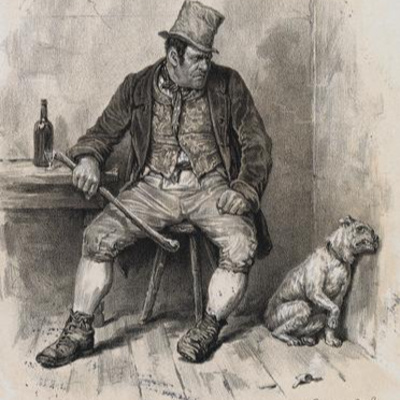
Empathy versus bullying: The biggest bully in my life
This is the first podcast in a series on empathy and bullying. The author, Lou Agosta, talks about "the biggest bully in my life" and how empathy is the antithesis of bullying. Bullying is precisely defined and how empathy can be used to deal with bullying is engaged. Inducing empathy in the bully by asking: "How would YOU feel if this [the violence or bad language] were done to you?" does NOT work because the bully is usually not in touch with his feelings. Rather the recommendation and response of empathy is to set limits - reestablish the boundary of dignity and respect between self and other which has been violated by the bullying. The devil - and the empathy - are in the details. Find out how to get your power back in the face of bullying in this podcast.

Reclaiming Conversation in Online Therapy: An Imaginary Dialogue With Sherry Turkle Between Lou Agosta and Arnon Rolnick
Arnon Rolnick and Lou Agosta discuss the work of Sherry Turkle. Professor Turkle gets off a good “Jeremiad” about the damaging effects of beeping, chirping, distracting, interrupting, messaging device. One of the main negative effects is a kind of acquired attention deficit on the part of large segments of the population/community. Key term: acquired attention deficit. The smart phone and text messaging is a significant disruptor to one's ability to be present with oneself and with others. One of the main effects of the digital revolution in everything is that we the community has an "acquired attention deficit" due to device interruptions. A lot of distance exists on the spectrum between "better than nothing" and "better than everything else." Turkle’s “from better than nothing to better than anything” is a straw man (person) to be shot down. Like Winnicott's "good enough" mother - therapy strives to be "good enough" - trying to be perfect is another source of pathology - becoming obsessive or borderline. Now how does all that apply to performing psychotherapy online via video meeting technology? Check out this engaging conversation between Arnon and Lou about Turkle's incisive and penetrating contribution.
Check out the original Youtube version: https://youtu.be/6OId-0QDFys
Check out the blog post for a complete transcript: www.EmpathyLessons.com
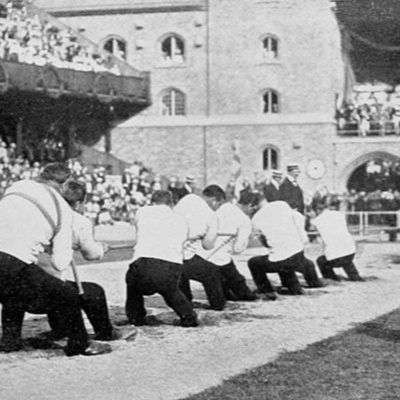
Resistance to Empathy and How to Overcome it (Part 2): Individual Provider and Receiver (of Empathy)
Empathy is supposed to be like motherhood, apple pie, and puppies. What’s not to like? A lot. People can be difficult—very difficult—why should empathizing with them be easy? Yet most of the things that are cited as reasons for criticizing and dismissing empathy—emotional contagion, projection, misinterpretation, gossip, messages lost in translation and devaluing language—are actually breakdowns of empathy. Find out how to practice and train one’s empathy to shift breakdowns in empathy to breakthroughs in empathic receptivity, understanding, responsiveness, possibilities of flourishing, enhanced humanity, relatedness, and building community.
This episode is also available as a blog post: http://louagosta.com/2021/06/19/resistance-to-empathy-and-how-to-overcome-it-part-2-individual-provider-and-receiver-of-empathy/
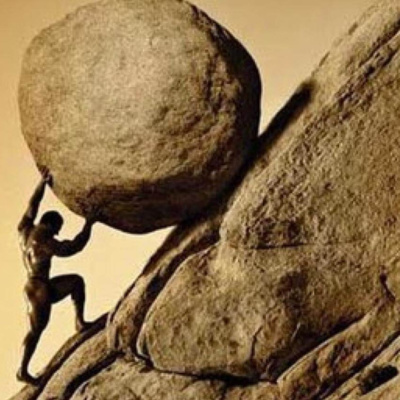
Resistance to Empathy and How to Overcome it (Part 1: Organizational Resistance to Empathy)
The qualities that make organizations successful are not always the qualities that enhance their empathy. Beating the competition in the market, overcoming technical and legal problems, and "getting your numbers," do not reliably expand your empathy.
It often seems that compliance and rule-making, not empathy, are trending. The organization drives out empathy by enforcing conformity to an extensive and contradictory set of rules, whose complexity is such that at any give time, the individual is technically (though unwittingly) in violation of one of them. What to do about it?
Empathy has a key role to play in organizations in reducing conflict, overcoming “stuckness,” eliminating self-defeating behavior, building teams, fostering innovation, developing leadership, and enhancing productivity. The empathy lesson is to use humor (and empathy) to undercut resistance to empathy in the organization. In this dynamic and engaging podcast, expand your empathy and find out how empathy is a source of creating possibilities, overcoming conformity through innovation, and leading from a future of possibilities.
This episode is also available as a blog post: http://louagosta.com/2021/06/14/resistance-to-empathy-and-how-to-overcome-it/

The Secret Underground History of Empathy (complete talk)
I know what you feel because I feel it, too, as a vicarious experience, not a merger. Without any prerequisites, this presentation engages the deep history of empathy, exploring the underground dynamics of sympathy, fellow feeling, vicarious feeling, in art, altruism, story telling, before the word “empathy” emerged. Without any prerequisites, empathy is engaged through the lens of selected methods of inquiry including phenomenology, hermeneutics, psychoanalysis, and linguistic philosophy. The secret underground history of empathy includes works by Hume, Kant, Lipps, Freud, Husserl, and, time permitting, Kohut. When all the philosophical arguments are complete, when all the Freudian transference and countertransference is analyzed, when all the phenomenological methods are reduced, when all the hermeneutic circles are spun out, in empathy, one is quite simply in the presence of another human being. Get present in this engaging and entertaining talk on empathy and expand yours!
The one slide hand out (to which reference is made in the podcast) is available at: https://wordpress.com/post/empathyinthecontextofphilosophy.com/2181
(c) Lou Agosta, PhD / LAgosta@UChicago.edu
![Empathy: The one-minute training [no kidding!]](https://d3t3ozftmdmh3i.cloudfront.net/production/podcast_uploaded_episode400/13993176/13993176-1619736502701-e67693dcc5465.jpg)
Empathy: The one-minute training [no kidding!]
Expand your empathy here-and-now. Empathy training consists in overcoming the obstacles to empathy that people have unwittingly acquired in being taught to conform and survive the day. When the barriers are overcome, then empathy spontaneously develops, grows, comes forth, and expands. There is no catch, no “gotcha.” That is the one-minute empathy training, pure-and-simple. The devil is in the details and the deep work and tips and techniques around eliminating, overcoming, defeating the obstacles, resistance, and blocks to empathy. Find out what are the Big Four empathy breakdowns. It turns out that break downs in empathy, when handled carefully (and with empathy), result in breakthroughs in expanding empathy in the individual and in the community.
This episode is also available as a blog post: http://louagosta.com/2019/10/27/empathy-the-one-minute-training-no-kidding/
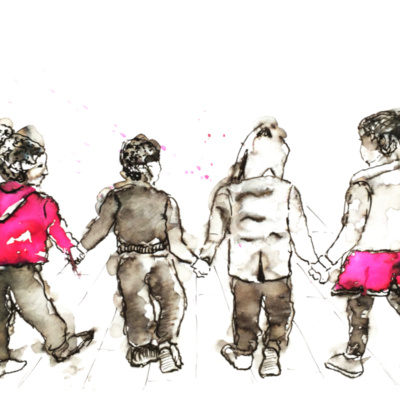
The Natural Empath Meets the Good Samaritan
To regulate your empathy, cross the street. This is an edgy and confrontational way of putting it, but it is literally accurate. Cross the street away from the neighbor to “down regulate” your empathy, and experience less empathic distress; and cross the street towards your neighbor to expand your empathy in the direction of creating an inclusive community of persons, who recognize the value of cooperation.
The empathy lesson is that the vicarious experience does not have to be overwhelming. Rather, with practice, and even if you are a natural empath, you are able to shift your focus from suffering to neighborliness; you are able to shift your attention from suffering to making a difference and enhanced self-esteem, expanding community and shared humanity.
The Natural Empath requires special attention. Most people need to expand - "up regulate" - their empathy; in contrast, the Natural Empath may usefully practice techniques of "down regulating" - setting boundaries to - her or his empathy. Find out how to do that in this engaging podcast.
This episode is also available as a blog post: http://louagosta.com/2021/06/06/the-natural-empath-meets-the-good-samaritan/
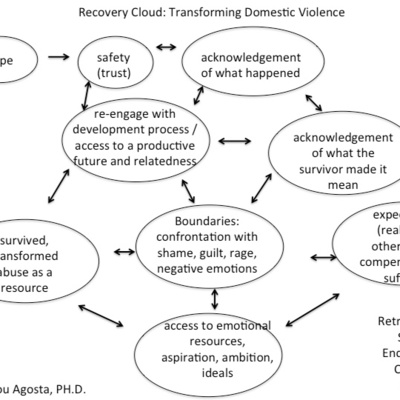
How to know if you are in an abusive relationship and what to do about it - spike in domestic violence accompanies pandemic shelter at home
Three women a day die because of domestic violence (nnedv.org). What is gender violence? How many women and children suffer abuse? How to tell if you are in an abusive relationship? Why was Apna Ghar [Our Home] created? Join Lou Agosta and Radhika Sharma to answer these questions. We will also discuss how we as a society can support survivors of violence and prevent gender violence. Awareness of domestic violence – also called “intimate partner abuse” – has reached a level of Awareness where USA Today has a regular section on the latest perpetrations. Many who have been doing the difficult work for years are starting to be heard: Apna Ghar (Our Home) Inc., a 25-year old non-profit addressing the needs of immigrant and refugee women and their children who have suffered gender-based violence. Apna Ghar provides services to hundreds of immigrant and refugee women and children from Asia, the Middle East, Africa, and Bosnia. Find out how you can make a difference.
This podcast is a rebroadcast of a live, on the air conversation about domestic violence with the director of education and training, Radhika Sharma, at ApnaGhar. Due to the predicament of victim and survivors having to shelter in place during the pandemic, this matter is even more urgent than when originally recorded in May 2015.
A version of this episode with a different angle - a book review, not a conversation - is also available as a blog post: http://louagosta.com/2020/04/12/spike-in-domestic-violence-dv-accompanies-pandemic-shelter-at-home/

Empaths don’t get enough empathy
This gift of empathy shows up as a mixed blessing, since the natural empath experiences the pains and sufferings of the world more intensely and deeply than do other individuals. Less charitable people redescribe the “natural empath” as someone who is “irritable” or “overly sensitive.”
Granted, the natural empath brings a deep sensitivity to the experience of human suffering and joy, the natural empath also lives through the nuances and delicate details of the experiences intensely. Too intensely?
The properly empathic empath uses his or her empathic receptivity as to who the other person is as a possibility. The empath takes a walk in the other’s shoes with the other’s foot size, giving back and responding to the other individual her experience in a form of language such that the other person recognizes it as her own. As the empath learns to set firm boundaries and limits, her intuition is transformed into sustainable, usable empathy in the full sense from which both she and the community benefit. The devil and the guidance lives in the details. Get them in this engaging and empathic treatment of the empath's empathic struggles.
(c) Lou Agosta, PhD, and the Chicago Empathy Project
![Galileo’s Middle Finger: Speaking Truth to [Transgender] Power – and Power Talks Back](https://d3t3ozftmdmh3i.cloudfront.net/production/podcast_uploaded_episode400/13993176/13993176-1622225654669-1de96eee681c4.jpg)
Galileo’s Middle Finger: Speaking Truth to [Transgender] Power – and Power Talks Back
A scientist has not been burned at the stake in over 350 years - and even then it was Giordano Bruno, not Galileo. Find out how Professor Alice Dreger (PhD) become an advocate for survivors of intersex sexual reassignment surgery and she becomes a strong candidate to be burned in effigy by those for whom she was advocating.
This is a reposting of a book conversation from 2015, now included as a podcast (originally recorded on April 29, 2015 as a live, on air conversation with Alice Dreger, PhD, Professor of Medical Humanities, Northwestern Feinberg School of Medicine).
With transgender dynamics, identity, politics, and everything exploding in the headlines, the need for empathy around sexual identity and related issues are even more urgent and timely today than they when originally broadcast. Find out what happens to people whose sex was reassigned surgically at birth while they were still infants and they were not told. You can't make this stuff up. Empathy is no rumor in the contribution of Alice Dreger; empathy LIVEs in her work. Not to be missed.
This episode is also available as a blog post: http://louagosta.com/2021/05/28/review-galileos-middle-finger-speaking-truth-to-transgender-power-and-power-talks-back/
(c) Lou Agosta, PhD and the Chicago Empathy Project

The Big Four Empathy Breakdowns - and What To Do About Them: How To Transform Them into Empathy Breakthroughs
The Big Four breakdowns of empathy are: emotional contagion, conformity, projection, and getting lost in translations. Every breakdown contains within itself the possibility of a breakthrough. Join Lou in finding out how to transform breakdowns in empathy into breakthroughs in empathy in this engaging and challenging podcast.
(c) Lou Agosta, PhD, and the Chicago Empathy Project
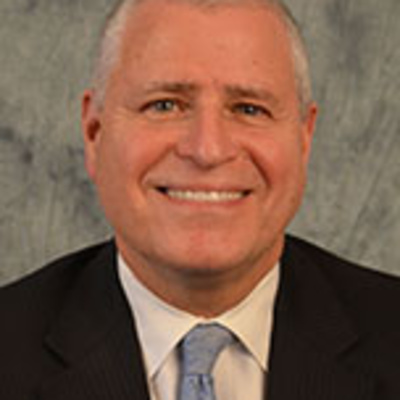
Everything You Wanted to Know About Emerging Adulthood but Were Afraid to Ask: Addiction, Learning Challenges, Failure to Launch, and Helicopter Parents
Join Lou Agosta and his special guests Drs. Jesse Viner and Dale Monroe-Cook for an engaging conversation about the emotional, psychological, and human challenges of emerging adulthood. Drs. Viner and Monroe-Cook address these issues with their clients as Medical director and VP for Clinical Operations at YellowBrick, a national treatment center specializing in working with troubled emerging adults. What is emerging adulthood? What kind of breakdowns do the generations between 18 and 29 years old encounter in engaging in relationships, careers, finance, and life? How does the YellowBrick provide a foundation for turning break-downs in self-defeating behavior, emotional upset, addiction, learning disabilities, acting out, into break-throughs in accomplishment, personal satisfaction, and rewarding results? Drs Monroe-Cook and Viner has years of experience partnering with young adults, and their families, in breakdown and breakthrough. Join me and benefit from their guidance.
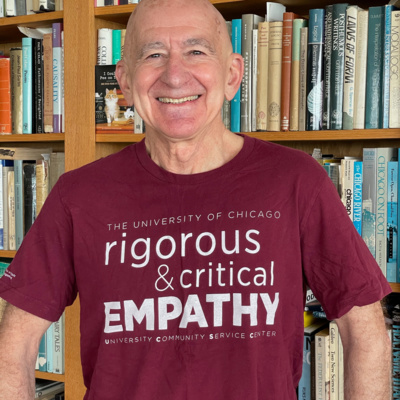
A Rigorous and Critical Empathy: Perform a Readiness Assessment
Empathy is never needed more than when it seems there is no time for it. Empathy is never needed more than when it seems the budget does not allow for it. Empathy is never needed more than when the cynicism and resignation about life, whether in the family or the corporate jungle, are so thick you can’t catch your breath.
Being ready for empathy is like being ready to be born. No one is ready to be born. You just get born. Ready or not, the individual is thrown into the world. No one asked you if you wanted a life. You just got one.
Likewise, with empathy - find out what it takes to create a clearing for success in expanding your empathy. Engage with the empathy readiness assessment here. You will be glad you did!
This episode is also available as a blog post: http://louagosta.com/2021/05/14/a-rigorous-and-critical-empathy-perform-a-readiness-assessment/
(c) Lou Agosta, PhD, and the Chicago Empathy Project

A Rumor of Empathy in Modern Music: A Conversation with Mischa Zupko, composer, teacher, artist, musician
In this podcast, join me and my special guest musician, teacher, and composer Mischa Zupko for a conversation about music, the emotions, empathy, and community, originally broadcast live and in person on Wednesday June 3rd (2015) on VoiceAmerica Empowerment Radio. Mischa is an accomplished music teacher and composer. Music stimulates us to intense emotions, both high and low. Music sets the mood in movies. It stimulates buying behavior in ads. It relieves depression. It gets people dancing. Music can stimulate people with Parkinson’s disease who cannot otherwise move. Stroke patients can sing words that they cannot otherwise say. Music is a powerful force for bringing people together into community. Music takes up more space in the brain than language does – being human means being musical. Empathy is no rumor in Mischa's compositions and performances. Empathy LIVEs in his work. Join me for an amazing conversation with musician, teacher, and composer Mischa Zupko.
(c) Lou Agosta and the Chicago Empathy Project

Empathy is a dial, not an on-off switch
People think of empathy as an "on off" switch. Turn empathy "on" for friends, family, the home team - turn empathy "off" for the bad guys, the competition, or unwelcome visitors. Empathy then tends to get stuck in the "off" position. Rather approach empathy as a dial or tuner - turn it up or turn it down - tune it up or tune it down - in one's relationships in the family, community, business, and interactions of all kinds.
This is a new idea to most people - and it does not come naturally. Practice is needed. Training is useful - hence, the guidance of this podcast. Expand your empathy - and your power over empathic relatedness - by checking out this podcast today and following its guidance.
Image Credit: Alex Zonis: Freud and his famous cigar in front of the dials and levers that turn/tune empathy up or down
This episode is also available as a blog post: http://louagosta.com/2019/12/10/empathy-is-a-dial-not-an-on-off-switch/
![How Things Were Done [Empathically] in Odessa: A Conversation with Jonathan Brent, Executive Director, YIVO](https://d3t3ozftmdmh3i.cloudfront.net/production/podcast_uploaded_episode400/13993176/13993176-1620443092482-8a021b73f233f.jpg)
How Things Were Done [Empathically] in Odessa: A Conversation with Jonathan Brent, Executive Director, YIVO
Join Lou for a conversation with Jonathan Brent, Executive Director of Yivo about how things were done in Odessa. This refers to a celebrated story by Isaac Babel. In 1925, the YIVO Institute for Jewish Research was founded in Vilna (Wilno, Poland; now Vilnius, Lithuania), by key European intellectuals, including Albert Einstein and Sigmund Freud, to record the history and pioneer in the critical study of the language, literature and culture of the Jews of Eastern Europe. From its inception, YIVO was deeply concerned that the language and culture of East European Jewry were undergoing radical change in a rapidly modernizing world. YIVO's founders were tireless in collecting the documents and archival records of Jewish communities across Eastern Europe, years before anyone could have predicted the devastation that would befall them. Join Lou and Jonathan as they bring forth empathy and make it present in an amazing conversation about the work being done at Yivo and about Jon's penetrating and incisive commentary on a the world of the Jewish People of Eastern Europe at the end of the 19th and beginning of the 20th Century, a world as different from our own as that of Moses before and after he encountered the burning bush.
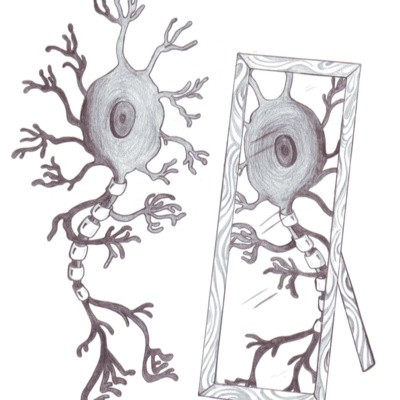
Empathy, Stress, Brain Science – the Course!
A famous person (Heinz Kohut) once said: "Empathy is oxygen for the soul." So if one is feeling shortness of breath, maybe one needs expanded empathy! This course will connect the dots between empathy and neuroscience ("brain science"). For example, empathic responsiveness releases the compassion hormone oxytocin, which blocks the stress hormone cortisol. [This is an over-simplification, but a compelling one.] Reduced stress correlates to reduced risk of such life style disorders as cardiovascular disease, diabetes, weak immune system, depression, and the common cold.
The session engages each of the following modules in the discussion segment, including suggested readings. The course will cover the following topics
- This is your mind on neuroscience - mirror neurons: do they exist, and if not, so what?
- MRI research: as when Galileo looked through the telescope, a whole new world opens
- Sperry on the split brain: the information is in the system: how to get at it
- The neuroscience of trauma - and how empathy gives us access to it
This episode is also available as a blog post with a link to the Youtube video that includes the visual slides for your convenience: http://louagosta.com/2016/12/18/empathy-stress-neural-science-the-movie/
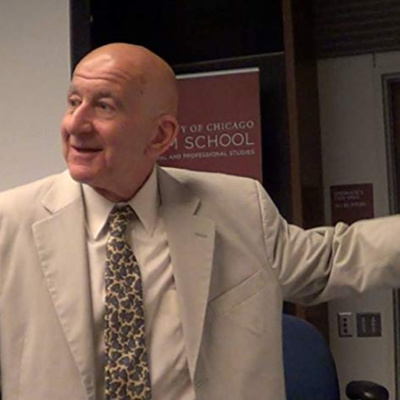
Empathy and compassion fatigue: A radical proposal for overcoming it
What is the difference between empathy and compassion? One of the criticisms of empathy is that is leaves you vulnerable to compassion fatigue. The helping professions are notoriously exposed to burn out and empathic distress. Well-intentioned helpers end up as emotional basket cases. There is truth to it, but there is also an effective antidote: expanded empathy. Discover a radical proposal: how providers of empathy can overcome compassion fatigue and regulate their own empathy to manage and overcome the risk of burnout and compassion fatigue. Not to be missed!
This episode is also available as a blog post: http://louagosta.com/2019/11/17/compassion-fatigue-a-radical-proposal-for-overcoming-it/
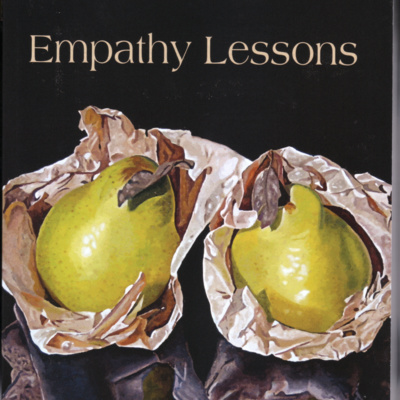
The Evidence: Empathy is Teachable, Trainable, Learnable
Tired of people talkin' out of their hats about "lack of evidence" for empathy? Such assertions are incorrect. Here are many peer-reviewed, evidence-based publications. I discuss the details - and the evidence.
This essay is an excerpt from Chapter Four of the book Empathy Lessons. This essay is motivated by the need to debunk the position that the practice of empathy is vague and fuzzy and cannot be taught, that you either have it or you don't. Bunk. I am addressing scientists, researchers, health care professionals, who are properly skeptical or improperly dismiss empathy as not scientific of evidence-based.
Substantial evidence is available that if you practice empathy, you get better at it. A bold statement of the obvious? Indeed. Yet the requirement to marshal the evidence is a significant one, even if it is often a function of resistance to practicing a rigorous and critical empathy. Key term: resistance to empathy. Overcome the resistance to empathy and the practice of empathy spontaneously and naturally comes forth.
This podcast talks about the evidence and, for practical reasons, does not contain all the bibliographical references in detail (since it would be impractical and clutter up the talk), so if you want/need the bibliographical references in detail without buying the book see the original blog post where the references are available without cost: https://louagosta.com/2021/04/24/the-evidence-empathy-is-teachable-trainable-learnable/
[See also Empathy Lessons and other books by Lou Agosta on empathy: https://amzn.to/2S0ISPr - have the university of institute library order a copy.]
The evidence is substantial and needs to be better know - get out the word - and check out the evidence today!
As noted above, this episode is also available as a blog post: http://louagosta.com/2021/04/24/the-evidence-empathy-is-teachable-trainable-learnable/
(c) Lou Agosta, PhD and The Chicago Empathy Project

Listening to Killers: James Garbarino interviewed by Lou Agosta on Jim's 20 years as an exert witness in murder cases
James Garbarino presents lessons learned from his twenty plus years as a psychological expert witness in murder cases. Understanding the victims of violent crimes and the survivors is relatively easy for any decent human being. It is easy to include the survivors in the circle of caring of the community. However, what about understanding the killer?
Garbarino succeeds almost beyond measure in being a voice for killers. They get a hearing. It is not always easy to listen to – but the humanity is there in a way that needs to be heard. No one is saying that some of these individuals should get out of prison – many are so damaged that it would make no sense and be a risk. However, in other instances, the conversation may be necessary. Our thanks to Jim for the contribution and for the journey, still underway. Garbarino listens to killers and bears witness to humanity in its many struggling and estranged forms. Empathy is no rumor in the work Jim Garbarino is doing – and we acknowledge his. Shift your listening - expand your empathy - check out this podcast!
See original blog post: https://empathyinthecontextofphilosophy.com/2016/05/20/listening-to-killers-by-james-garbarino-an-interview-with-lou-agosta-2/
(c) Lou Agosta, PhD and the Chicago Empathy Project
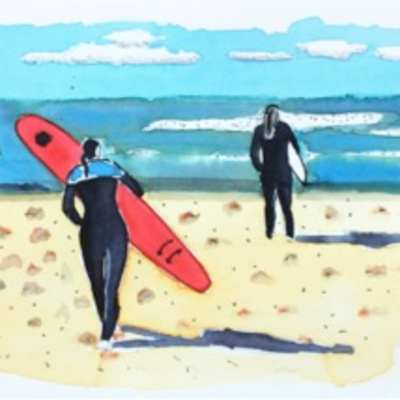
The Evidence: Empathy is good for your health and well-being (Updated!)
Empathy has been criticized as not "evidence-based" or lacking in scientific rigor. This is incorrect. Extensive scientific and peer-reviewed research supports the position that empathy is good for you health and well-being. This podcast covers the research in a brainy but breezy way. The podcast discusses the relevance and the cytokine theory of depression, how this relates to inflammation and inflammation-reducing practices. It also takes a light-hearted and personal look at how the practice of empathy as well as a set of related practices such as mindfulness (meditation), yoga, and Tai Chi contribution to stress reduction (and what the heck is "stress" anyway).
Empathy is good for your health and well-being: Empathy is on a short list of stress reduction practices including meditation (mindfulness), Tai Chi, and Yoga. Receiving empathy in the form of a gracious and generous listening is like getting a spa treatment for the soul.
This episode is also available as a blog post: http://louagosta.com/2021/04/18/empathy-is-good-for-your-health-and-well-being-the-evidence/
(c) Lou Agosta, PhD and the Chicago Empathy Project
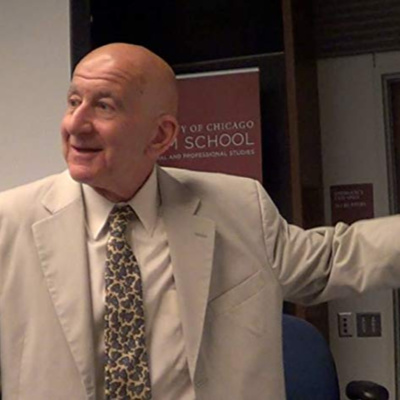
The Secret Underground History of Empathy (excerpt)
This podcast is an excerpt from a live, in person presentation entitled The Secret Underground History of Empathy delivered on July 14, 2016 (Bastille Day) at the University of Chicago Graham School of Continuing Education by Lou Agosta. It contains the four-fold analysis and definition of empathy as receptivity, understanding, interpretation, and responsiveness. It contains remarks on Paul Ekman's application of micro-expressions in relation to empathy and a Q&A segment. For those interested in expanding their empathy, not to be missed!
(c) Lou Agosta, PhD and the Chicago Empathy Project

Empathy is the New Love
The idea is that what people really want more than anything else is to be gotten for who they are – i.e., people want empathy. You know how in the world of high fashion grey is the new black? Well, empathy is the new love.
My proposal is that love contains an empathic core in its stimulating and exciting aspects and that which is the “love sickness” part is due, well, to the struggle to unite affection and desire. In particular, that which is the “love sickness” is due to a breakdown in empathy.
The goal in love is to erase, at least temporarily, the boundary between the self and other. Merger of both mind and body with the other mind and body is the result. In contrast to love, empathy navigates or transgresses the boundary between self and other such that the integrity of the self and other are maintained. One has a vicarious experience of the other—but the difference and integrity of the self and other are maintained. So love emerges as a breakdown in empathy—from the perspective of too much or too little engagement with the other. It is love versus empathy. Yet in love, empathy,
This episode is a selection plus bonus material available as a blog post: http://louagosta.com/2021/02/13/empathy-is-the-new-love/
Art work credit: The Ecstacy of Saint Teresa: Sculpture in marble by Gian Lorenzo Bernini
(c) Lou Agosta, PhD and the Chicago Empathy Project

A Rumor of Empathy in Heidegger
This is a live talk / presentation at the Illinois School of Professional Psychology at Argosy University on May 6, 2013 by Lou Agosta discussing his book Empathy in the Context of Philosophy, including an approach to empathy based on Martin Heidegger's challenge of producing "a special hermeneutic of empathy."
The talk takes the listener through Heidegger's design distinctions for human existence [Dasein] and these distinction apply to empathy and generate a Heideggerian definition of empathy including: affectivity, understanding, interpretation, and talk (speech) - as authentic forms of human relatedness. Lou tells a story about empathy based on a famous folk tale and concludes that empathy is the foundation of our humanity. Those interested in empathy and the philosophy of Martin Heidegger will want to make it a priority to listen to this one.
(c) Lou Agosta, PhD and the Chicago Empathy Project

The Case of Dr Know-it-all: Empathy Gives Us Our Humanity
You do not need a philosopher to tell you what empathy is. What then do you need? How about a folktale, a narrative, a fairy tale?
Rather than start with a definition of empathy, my proposal is to start by telling a couple of stories, in which empathy (and its breakdown) plays a crucial role.
Both stories are anonymous folktales from the collection edited by the Brothers Jacob and Wilhelm Grimm. The first story (Dr Know-it-all) features top down, cognitive empathy; the second story (The Youth Who Went For to Learn Fear) features bottom up, affective empathy.
Along the way, the listener encounters spirited hijinks, the neurology of [not] experiencing fear, empathy training, rich empathy lessons, and how empathy gives us our humanity. Not to be missed!
[View the original post: https://louagosta.com/2021/04/10/the-case-of-dr-know-it-all-empathy-gives-us-our-humanity/(opens in a new tab)]
(c) Lou Agosta, PhD and the Chicago Empathy Project

Three books on empathy reviewed: The good, the bad, and the ugly
Three books on empathy that you will want to check out - after getting the short version here. I had some fun with this one - and, you, the listener, will too, in addition to expanding your empathy. This podcast contains additional bonus material not in the original blog post about how I came to write a book length review of The Routledge Handbook of the Philosophy of Empathy, one of three books reviewed here along with William Miller's Listening Well: The Art of Empathic Understanding and Cris Beam's I Feel You: The Surprising Power of Extreme Empathy. The complete review of the Handbook is itself a book length work (A Critical Review of a Philosophy of Empathy by Lou Agosta), separately published.
This concise version of this episode is also available as a blog post: http://louagosta.com/2019/04/28/three-books-on-empathy-reviewed-the-good-the-bad-and-the-ugly/.
(c) Lou Agosta, PhD, and the Chicago Empathy Project